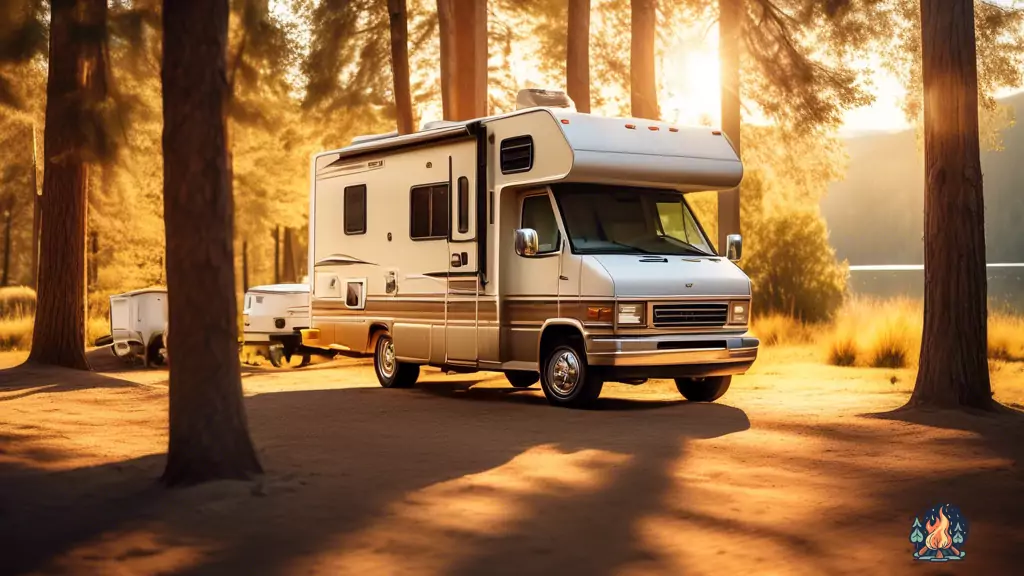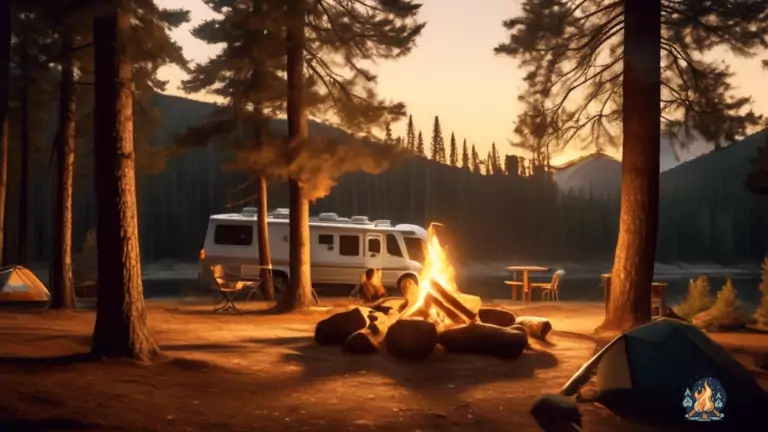Essential Tips For RV Tire Care
by Kevin Fairbanks • Updated: January 21, 2024
Ensure a smooth and safe RV journey with these essential tire care tips! Don’t miss out on expert advice to extend your tires’ lifespan. Start reading now for stress-free adventures!

Are you ready to embark on your next adventure in your trusty RV? Well, before you hit the open road, it’s crucial to pay attention to one of the most vital components of your vehicle – the tires! Taking care of your RV tires is not only essential for your safety but also for the overall performance and longevity of your recreational vehicle. So, buckle up and get ready for some essential tips that will have you rolling smoothly and laughing all the way to your next destination!
First things first, my fellow RV enthusiasts – regular tire inspections are an absolute must! I know, I know, inspecting tires might not sound like the most thrilling activity, but trust me, it’s a tire-sly important task.
Take a good look at the tread depth to ensure it meets the recommended measurements. And while you’re at it, don’t forget to check for any signs of wear, cracks, or bulges – those are definite tire-killers! Remember, a little TLC now can save you from a whole lot of tire-ouble later on.
Next up, let’s talk tire pressure – the unsung hero of a smooth ride. Maintaining proper tire pressure is like giving your RV a big, cozy hug. Don’t be deflated if you’re not sure about the right pressure – just consult your RV’s manual or the tire manufacturer’s recommendations.
And hey, don’t be a pressure pushover, make sure to check those tire pressures regularly! Trust me, your RV will thank you, and you’ll be on your way to a tire-riffic journey in no time!
Key Takeaways
- Regularly inspect tire tread depth, signs of wear, cracks, and bulges.
- Maintain proper tire pressure for a smooth ride and fuel efficiency.
- Rotate tires regularly to ensure even wear and longevity.
- Consider the age of tires and replace them if they exceed the recommended lifespan.
Regularly Inspect Your RV Tires
You need to make sure you’re regularly inspecting your RV tires to keep them in the best condition possible.
Think of it like checking in on your tires, just to make sure they’re not feeling neglected or underinflated.
It’s like giving them a little love tap and saying, "Hey there, tire, how are you holding up? Are you feeling a little deflated today?" And if they are, don’t worry, it happens to the best of us.
Just grab your trusty tire pressure gauge and give them a little boost of air. It’s like giving them a breath of fresh air, quite literally.
Now, I know what you’re thinking, "But why do I need to inspect my tires? Can’t they just take care of themselves?" Oh, if only that were true.
Unfortunately, RV tires can’t magically fix themselves like a superhero with a tire cape. They need your help.
So, take a few minutes every month to give them a good once-over. Look for any signs of wear and tear, like uneven tread wear or bulges on the sidewall.
And don’t forget to check the tire pressure too, because nobody likes a flat tire. Trust me, your RV tires will thank you for it, and who knows, they might even reward you with a smooth and comfortable ride.
Maintain Proper Tire Pressure
To ensure optimal performance and durability, it’s important to regularly check and adjust the pressure of your RV’s tires.
Think of it like giving your tires a little love tap, but instead of using your hand, you use a trusty tire pressure gauge. And don’t worry, this isn’t some fancy tool that requires a degree in rocket science to operate. It’s as simple as pressing it against the valve stem and seeing what number pops up.
Just make sure to check the pressure when the tires are cold, because like humans, tires can get a bit hot and bothered after a long drive.
Now, I know what you’re thinking. "But why is tire pressure so important anyway?" Well, my friend, let me enlighten you. Maintaining proper tire pressure not only ensures a smoother ride, but it also helps with fuel efficiency. Yes, you heard that right. By keeping those tires properly inflated, you’ll be saving some precious pennies at the pump. Plus, it helps prevent uneven wear and tear, which can lead to a whole lot of trouble down the road.
So, do yourself a favor and give those tires the attention they deserve. Your RV will thank you, and you’ll be cruising down the highway like a tire pressure pro.
Rotate Your Tires
Regularly rotating your tires is crucial for maintaining their longevity and ensuring even wear. It’s like giving your tires a little spa day, except instead of cucumbers on your eyes, it’s a fresh new position on your vehicle.
By rotating your tires, you’re basically giving them a chance to take a break from their usual routine and distribute the wear and tear more evenly. It’s like a vacation for your tires, and we all know how important it is to take a break every now and then.
Plus, it’s a great way to keep your tires on their toes, or should I say, treads?
Now, I know what you’re thinking. How often should you rotate your tires? Well, it really depends on your driving habits and the type of RV you have. As a general rule of thumb, it’s recommended to rotate your tires every 5,000 to 8,000 miles. But if you’re a road trip enthusiast or have a heavy RV, you might want to rotate them more frequently.
Think of it as changing your RV’s tires’ positions like you would change your socks. It keeps things fresh and prevents any one tire from feeling left out.
So, go ahead and give your tires the love and attention they deserve. Rotate them regularly and keep them rolling smoothly on the road.
Check for Signs of Wear and Damage
Inspecting your recreational vehicle’s tires for signs of wear and damage is crucial for ensuring safe travels on the road. For example, imagine a scenario where a family is driving their RV and suddenly experiences a blowout due to a worn tire, causing them to swerve off the road and into a dangerous situation. To avoid such a nightmare, here are some important things to keep in mind:
- Tread Depth: Make sure to check the tread depth of your RV tires regularly. A worn-out tread can lead to reduced traction, especially on wet or slippery surfaces. So, before heading out on your next adventure, grab a penny and insert it into the tread groove. If you can see Lincoln’s head, it’s time to replace the tire.
- Cracks and Bulges: Inspect the sidewalls of your RV tires for any cracks or bulges. These can be signs of internal damage or weak spots that could lead to a blowout. If you spot any, it’s best to replace the tire immediately to avoid any potential mishaps down the road.
- Uneven Wear: Uneven wear patterns on your RV tires can indicate alignment or suspension issues. So, take a close look at the tread and check for any irregular wear. If you notice one side wearing more than the other or any other abnormalities, it’s time to get your RV checked by a professional.
- Age: Even if your RV tires look fine, it’s important to remember that they have a lifespan. Tires typically last around 5-7 years, depending on various factors like usage and storage conditions. So, even if they appear to be in good shape, consider replacing them if they are older than their recommended lifespan.
Remember, your RV tires are the only thing connecting your vehicle to the road, so taking care of them is essential for a safe and enjoyable journey.
Happy travels!
Store Your RV with Care
When storing your RV, it’s important to take precautions to ensure the tires remain in good condition. First and foremost, make sure you find a nice, cozy spot for your RV to hibernate. I’m talking about a spot that’s dry, cool, and preferably free from any sharp objects that might decide to have a little fun with your tires.
You don’t want your tires to wake up from their beauty sleep with a surprise puncture party, do you? Nah, I didn’t think so. So, find a nice, safe spot and tuck your RV in for the winter.
Now, let’s move on to the next step in our tire care routine – the tire covers. Oh yes, these babies are like the cozy blankets for your tires. They protect them from the harsh elements and keep them warm and snug. Just like you wouldn’t go to bed without your favorite blanket, your tires shouldn’t be left without their covers.
It’s like a little fashion statement for your tires, too. Who doesn’t want their tires to be the envy of the campground? So, go ahead and invest in some good-quality tire covers and give your tires the TLC they deserve. You’ll thank me later when you see those shiny, happy tires ready to hit the road again.
Frequently Asked Questions
Can I use regular car tires on my RV?
No way, amigo! Regular car tires on an RV is a recipe for disaster. RVs need specialized rubber that can handle their weight and demands. Keep your ride safe and stick to proper RV tires.
How often should I check the tire pressure on my RV?
Hey there, tire-savvy traveler! When it comes to your RV’s tire pressure, it’s essential to check it at least once a month. Regularly monitoring the pressure prevents problems and promotes peak performance. Safe travels!
Is it necessary to rotate the tires on my RV?
No need to bust a tire over this one! While it’s not necessary to rotate the tires on your RV as often as a car, it’s still a good idea to do it every few years. Keep those wheels rollin’!
How can I tell if my RV tires are worn out?
Are your RV tires feeling a little flat? Well, it’s time to give them a little TLC! To tell if they’re worn out, just stick a penny in the tread. If you can see Abe’s head, it’s time for some new treads!
Are there any special considerations when storing my RV tires for a long period?
When storing your RV tires for a long period, remember to keep them inflated to the correct pressure, protect them from UV rays, and avoid parking on dirt or gravel. Oh, and don’t forget to give them a farewell serenade! Just kidding… maybe.

Hi, I’m Kevin, a lifelong camping enthusiast and the voice behind Campfire Discoveries. From tent to RV to cabin camping, I’ve explored it all. Join me as we share stories and tips around the campfire, deepening our connection with the great outdoors.
Keep Reading
-
Essential Campfire Safety Tips For Outdoor Enthusiasts
Learn the essential campfire safety tips you need for a safe and unforgettable outdoor adventure. Don’t risk it, click now to ensure a memorable trip!
-
Essential Tools And Equipment For Your RV Camping Kitchen
Upgrade Your Outdoor Cooking Game with These Must-Have Camping Kitchen Essentials! Don’t Miss Out on the Best Tools and Equipment for Your RV Adventure. Click Here Now to Discover More!
-
The Ultimate RV Packing Checklist For Beginners
Get ready for your next RV adventure with our ultimate RV packing checklist for beginners! Don’t hit the road without being fully prepared. Check out our guide and start packing today!



